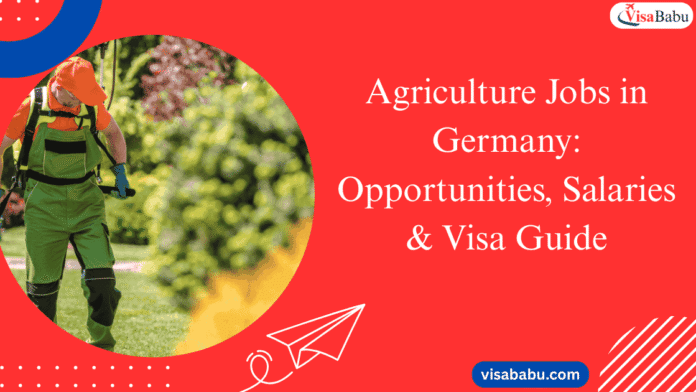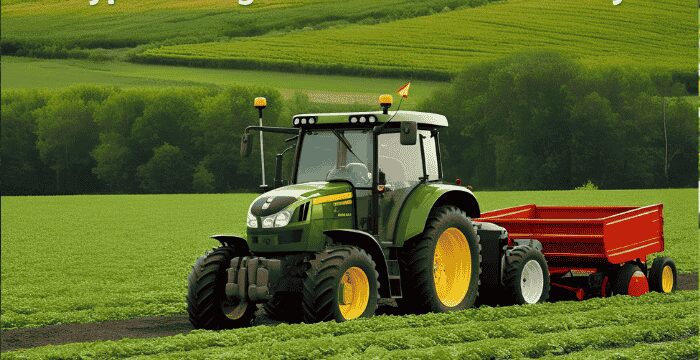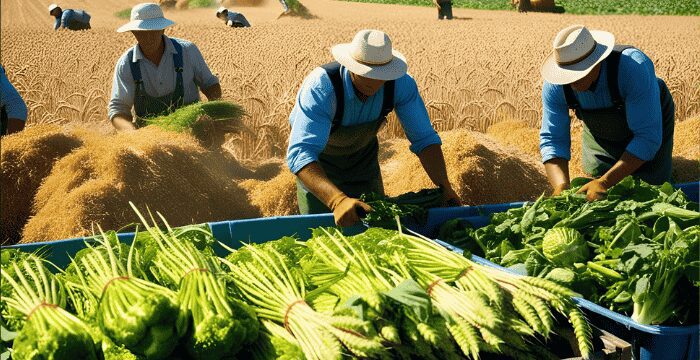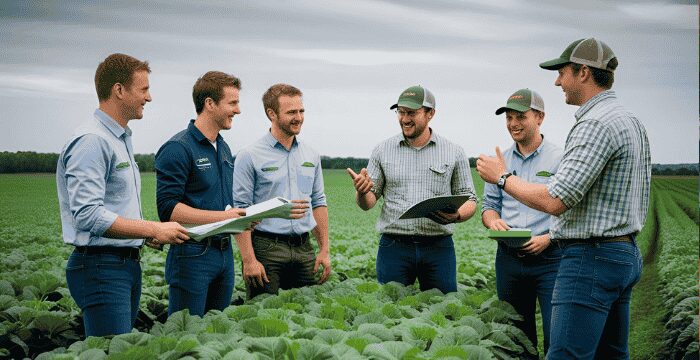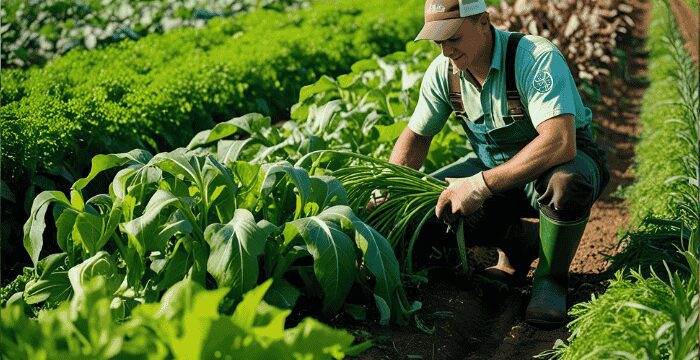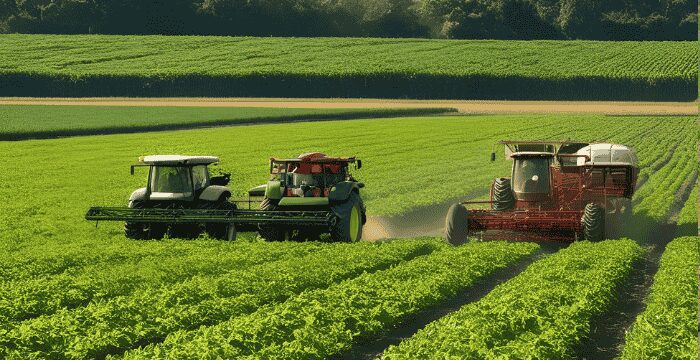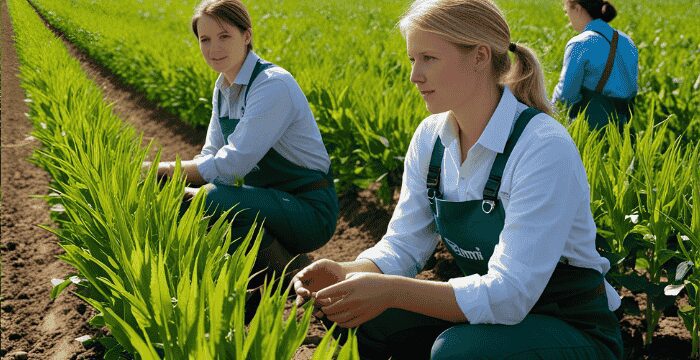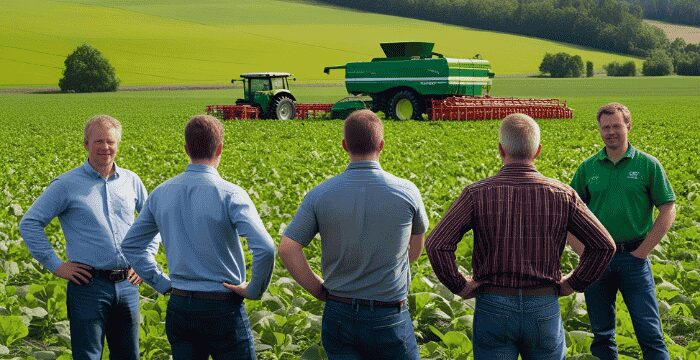People from Germany and abroad can find a wide range of jobs in the country’s agriculture sector. You can find jobs in farming at any time of year, in technology or in particular fields, thanks to the strong German agricultural industry. This comprehensive guide to agriculture jobs in Germany will help you navigate the employment landscape, including opportunities, qualifications, visa requirements, and application processes for Indians and other international job seekers.
Latest Types of Agriculture Jobs in Germany in 2025
The agricultural sector in Germany includes many kinds of jobs suitable for people with different qualifications. Understanding the various agricultural jobs in Germany will help you identify which roles match your skills.
Diverse Careers in Farming
These agricultural jobs in Germany form the foundation of the country’s food production system. In Germany, those working in farming are required for roles such as:
- Farm Worker: A Farm Worker is responsible for tending to plants and animals, as well as looking after the equipment. Usually, these jobs call for someone fit and familiar with farming.
- Seasonal Agricultural Worker: This job includes planting, harvesting and many other farm tasks during summer, mostly for crops like corn grown from the end of July to mid-October.
- Livestock Caretaker: A Livestock Caretaker looks after the diet, reproduction and well-being of farm animals; they should have some knowledge of animal husbandry.
Such posts are sometimes available to international workers who do not speak much German, so they are a good way for them to start in the German agricultural industry. Accommodation and meals are often included with farm work, which makes it easier for those arriving in Australia.
Trending Agriculture Jobs in Germany in 2025
Specialised agriculture jobs in Germany often require specific training or certifications. People with specific agricultural skills can find various specialist jobs in Germany.
- Horticulturist: Requires taking care of fruits, vegetables and ornamental plants by studying how plants grow and how to manage them.
- Agricultural Technician: An Agricultural Technician is involved in farming research, gathers data and helps apply farming technologies that connect old and new approaches to farming.
- Egg Merchandisers: People responsible for grading, packaging and bringing egg products to markets.
- Tree Planting Crew/Tree Nursery Labourers: Those in this category set up and maintain tree nurseries, as well as plant and care for trees.
Generally, these positions require professional training and are offered with better pay and full-time status. Most of them are required to have prior training or a background in what they do.
Agriculture Jobs in Germany: Technical and Research Areas in 2025
Higher-paying agriculture jobs in Germany include technical and research positions. People with higher education qualifications can find opportunities in Germany.
- Agricultural Engineers: To design or improve farming equipment, buildings and infrastructure systems, one typically has to be an Agricultural Engineer with a bachelor’s or a master’s degree.
- Agronomists: Work on methods to boost the productivity and sustainability of crops by using scientific approaches in farming.
- Food Scientists: Examine the ingredients in food, design and make new products and help maintain food safety and quality.
- Research Scientists: Experiments and studies are carried out by Research Scientists to gain new agricultural knowledge and develop modern technologies or approaches, most commonly in research labs.
- Environmental Consultants: Help farms become more sustainable and environmentally friendly without lowering their output.
To obtain one of these jobs, you generally need a degree in the right subject area and will likely earn between €50,000 and €90,000 each year, depending on your experience and the area of engineering.
Latest Agriculture Jobs in Germany for Indians 2025
While there are many ways for Indian experts to pursue careers in agriculture in Germany, they should be sure to plan and organise carefully.
Getting a Visa and Being Eligible
Securing agriculture jobs in Germany requires understanding the appropriate visa pathways. Citizens of India must have a work visa to begin agricultural work in Germany. Options include:
- EU Blue Card: The EU Blue Card is for graduates who want to live and work in Germany for as long as four years.
- Standard Work Permit: For individuals hired by German businesses, the standard process requires them to prove their employment and qualifications.
- Seasonal Worker Visa: Used for hiring staff to work in agriculture during the harvesting times.
In most cases, you will use these steps when applying for the job:
- Receiving an offer from a German company that is willing to help you get a visa
- You can apply for a work visa by visiting the German embassy or consulate in India.
- I must include my job offer, passport, medical certificate and proof of where I will live.
- I was not able to visit Germany until after receiving the visa.
For agriculture jobs in Germany for Indian applicants, it’s important to start the visa process well in advance of intended employment dates, as processing can take several weeks to months.
The Process Of Recognising Qualifications for Agriculture Jobs in Germany 2025
For many agriculture jobs in Germany, having your qualifications officially recognised is essential. The Indian agricultural qualification has to be recognised officially in Germany.
- Verification of educational credentials: Ensuring the authenticity of your Indian degrees or certificates is needed for verification.
- Assessment of equivalence: Your achievements will be checked against German standards to find out if you can practice your desired profession.
- Evaluation process: The German authority will match your foreign qualifications to a German qualification to find out if they are equivalent.
The process is especially vital for professions and roles that must comply with regulations. The German government has made resources available at the “Recognition in Germany” portal to guide you through this process.
Latest Language Requirements for Agriculture Jobs in Germany 2025
While English is sometimes enough in agriculture for research and technical jobs, speaking German, even just a little bit, will help a lot in Germany.
- People starting out in farming may only require basic German or English communication skills.
- Generally, employers need B1 proficiency in German for technical and management jobs.
- Those who interact directly with local farmers should have good German skills.
Many Indians wishing to find work abroad choose to learn German before or when applying for jobs. Different platforms and institutes available online in India provide German classes for people looking to find jobs in Germany.
Latest Monetary Compensation and Benefits in the German Agricultural Field 2025
Compensation for agriculture jobs in Germany varies widely based on specialisation and experience. Knowing how farm workers are paid helps potential workers in agriculture understand what to expect in Germany.
Salaries for Agriculture Jobs in Germany: Vary Based on the Role in 2025
German agricultural workers’ earnings depend on their job, the number of years they have worked and where they are based.
| Position | Annual Salary Range (€) |
| Farm Manager | 45,000 – 70,000 |
| Agricultural Engineer | 50,000 – 80,000 |
| Agronomist | 40,000 – 65,000 |
| Agri-Technician | 35,000 – 55,000 |
| Research Scientist | 55,000 – 90,000 |
| General Farm Worker | 28,000 – 35,000 |
At the initial level, people working in agriculture earn an hourly rate of €15.92 on average and an annual income of €28,957. Most seasonal workers receive between €10 and €14 per hour and may get other benefits such as housing and meals.
Work-Life Balance in Agriculture Jobs in Germany: Benefits and Importance in 2025
Farming businesses in Germany usually give their workers:
- Most people are expected to work for around 40 hours a week.
- Money is earned for additional hours worked in a single week.
- Employees are given 20 to 30 days of paid leave each year.
- Health insurance protection
- Pensions and fees for social security
- Make available travel assistance and necessary paperwork for workers from other countries
Workers hired for a short period may receive certain benefits:
- Affordable or free housing is available on the farm.
- Food at the workplace
- Wages and bonuses are given out during the busiest periods
- Payments for health insurance and social security
Because of these opportunities, Germany attracts Indian and other foreign agricultural workers, who find jobs and a nice place to live there.
How to Find and Apply for Agriculture Jobs in Germany in 2025?
Finding agriculture jobs in Germany requires using both general and specialised job platforms. Getting a job in agriculture in Germany requires you to use a planned approach to your job search and application.
Top Online Sites And Sources For Finding Work in 2025:
Agricultural jobs in Germany are found on various websites.
- Indeed.com: There are more than 200 available farm jobs that include visa sponsorship.
- EURES (European Employment Services): EURES is an EU website helping people find work in other EU countries.
- Make it in Germany: This is an official website from the German government with job openings.
- Specialised agricultural recruitment agencies: Agricultural recruitment firms aim to match workers from abroad with employers in Germany.
- Company career pages: Most agricultural companies post job openings on their website career pages.
- German Federal Employment Agency (Bundesagentur für Arbeit): Bundesagentur für Arbeit: Official workplace for government jobs
While searching these websites, put in terms related to what you are looking for, such as “agricultural technician jobs in Germany” or “livestock farming positions in Germany.”
The Process Of Filling Out An Application And Providing Papers 2025
Most of the time, the application process includes the following:
- The German-style resume (CV): Should be short, accurate and suited to German rules.
- Writing a cover letter: Highlight the key skills the job requires and tell them why you wish to join the agricultural workforce in Germany.
- Collecting educational certificates: Add all your educational qualifications and translate them if it is not in English.
- Supplying work references: Evidence of your previous work in agriculture is considered beneficial.
- Language proficiency documentation: A certificate stating your level of German or English, if it is needed for the job.
For agriculture jobs in Germany for Indian applicants, it’s important to follow German application conventions, which may differ from Indian practices. Usually, German companies prefer short and accurate information on applications rather than exaggerated claims.
Interview Preparation
Those successful in the process should plan for:
- Questions regarding how agriculture is done
- Demonstrate the skills you gained (in manual positions).
- Topics related to adapting to the German style of farming
- Information on getting a visa and moving to another country
For remote interviews, test your internet and choose a suitable place to conduct the interview. Plan to speak about how you are willing to adjust to the ways of farming and work in Germany.
Leading Companies Employing in the Agriculture Sector in Germany in 2025
Many agricultural jobs in Germany are concentrated within a few major employers. Large companies and organisations often look for agricultural workers in Germany.
The commercial farming industry and agribusiness.
A lot of the time, large farms are looking for workers.
- BASF Agricultural Solutions: Provides the START IN Agro Germany trainee program for graduates of agricultural courses.
- Bayer Crop Science is an international firm with major operations located in Germany.
- Südzucker AG is Europe’s foremost sugar producer and has significant farming operations.
- Germany’s DMK Group is the largest dairy cooperative.
- KTG Agrar SE is committed to producing food through organic farming on a large scale.
Working in these companies gives employees a clear way to progress and more opportunities for advancement than in smaller firms.
Visit Different Research Institutions and Universities
There are research-focused jobs available in agriculture.
- Leibniz Institute of Agricultural Development in Transition Economies: The Leibniz Institute of Agricultural Development in Transition Economies dedicates its research to agricultural economics.
- Julius Kühn-Institut: The Julius Kühn-Institut is the official federal research centre for cultivated plants.
- Thünen Institute: The Thünen Institute represents the Federal Research Institute for Rural Areas, Forestry and Fisheries.
- University of Hohenheim: The University of Hohenheim is a top provider of agricultural research.
- Technical University of Munich: Faculty of Life Sciences
They support researchers with backgrounds in agricultural sciences by giving them access to research and development projects.
Working in Agriculture During the Seasons in Germany in 2025
Temporary agriculture jobs in Germany follow specific seasonal patterns. Many agricultural jobs in Germany are seasonal.
Farmers also pay attention to harvest seasons and times when they need the most help.
The need for different crops to thrive changes with the seasons.
- Late July to mid-October is the time for corn harvesting.
- You can find jobs as a fruit picker during the spring and summer.
- Harvesting vegetables: It can change based on the crop.
- Most plants are grown during the spring.
Because of the changing seasons, many farms need to hire more workers when the workload increases. For Indian workers, doing seasonal jobs in Germany is a chance to get involved in the German agricultural sector.
Latest Requirements and Environment at Work in Germany 2025
Workers who help at harvest time anticipate:
- During busy times of the year, staff may work for 8-12 hours straight.
- Working in many different weather conditions that require effort
- Overtime pay is given when someone works more than 40 hours in a week.
- Training workers in the workplace for certain tasks
- Work areas that meet the requirements of German labour laws
- Many times, farmers provide temporary places to sleep for migrant workers.
Although seasonal work is often hard, it allows you to earn good money and learn about the farming methods used in Germany. A number of seasonal workers go back each year, which can give them a chance to get hired permanently.
The Future of Jobs in German Agriculture in 2025
The landscape of agriculture jobs in Germany is evolving with technological advancements. Changes in Germany’s agricultural sector are leading to new jobs and opportunities.
Technological Advancements
The agricultural industry in Germany is starting to use:
- Adopting AI and automation in farming draws interest from individuals who have technical capabilities.
- Drone monitoring allows for more accurate farming practices.
- Use of data analytics for better use of land and resources
- Technologies like sensors and automatic control systems are being used in smart farming.
As a result of these changes, people can find work as data analysts in farming, drone operators and precision farming specialists. Anyone who has IT skills and knowledge of farming may find these new jobs to be a good career option.
Sustainability Focus
Care for the environment is influencing the way farming is done.
- Organic farming expansion: Germany has seen significant growth in organic farming compared to other countries.
- Sustainable livestock management: Taking care of animals and caring about their effects on the environment.
- Water conservation techniques: Better irrigation and using recycled water are some water conservation methods.
- Using fewer chemicals: Adopting methods that control pests naturally and use natural fertilisers
- Lowering the carbon footprint: Use practices that decrease greenhouse gas emissions
As a result, companies focus on areas such as organic certification, making sure they meet environmental standards and finding sustainable methods of farming. Those who have learned or worked in these fields will be in greater demand in German agriculture.
Conclusion
The demand for qualified workers in agriculture jobs in Germany continues to grow as the industry evolves. Because salaries, working conditions and focus on new ideas are strong in Germany, agricultural careers are attractive to those who have the needed expertise. Those seeking work in German agriculture, in any area, can find employment and chances to improve their skills.
For Indian professionals considering agriculture jobs in Germany for Indian applicants, the combination of Germany’s need for skilled agricultural workers and its structured visa pathways makes it a viable career destination. While pre-planning, obtaining certificates and learning the language are necessary, the positive outcomes can include work and a comfortable lifestyle in one of Europe’s most well-off countries.
With Germany’s agricultural sector adopting new technologies and focusing on sustainability, more opportunities will open up for people who learn new skills. Understanding the requirements, preparing beforehand and approaching the process carefully can help international workers grow their careers in German agriculture.
FAQ(Frequently Asked Questions)
Q1. Which agricultural jobs are offered to international applicants in Germany?
Ans. There are many different agriculture jobs available in Germany, such as working on farms, becoming a horticulturist, agricultural engineer, food scientist or environmental consultant, taking care of livestock or assisting in farming technology. There are positions in these roles for beginners as well as for workers with advanced technical experience.
Q2. What are the visa requirements for Indians seeking agricultural jobs in Germany?
Ans. To work in Germany’s agricultural field, Indian citizens must first be issued the correct visa. A person can apply for the EU Blue Card if they are a skilled professional, for a Standard Work Permit if they have a job offer or for the Seasonal Worker Visa if the job is temporary. First, you must receive a job offer, apply at a German embassy or consulate for a visa and submit education, job and medical certificates.
Q3. Will I benefit from having my agricultural qualifications acknowledged in Germany, and if so, how do I get started?
Ans. It is necessary for many technical and specialised agriculture jobs in Germany that Indian certificates are recognised by the government. During the recognition process, your achievements will be checked, their similarity to German requirements will be studied, and your qualifications will be examined by a German authority. For professions and jobs that follow regulations, this is extremely important.
Q4. What language skills are required for agriculture jobs in Germany?
Ans. While a good level of German helps in finding a job, some jobs at the entry level and during certain seasons might not require German. Most technical and management jobs require you to know German at least at the B1 level. If you will be interacting with farmers or customers in person, you should have more developed German skills. Many Indians learn German before or after moving to Germany for their jobs.
Q5. How much can agricultural workers expect to earn in terms of wages and perks if they work in Germany?
Ans. The amount a person earns depends on their position and level of experience. A farm worker at the beginning of their career gets an average of €28,000 to €35,000, but those with specialised jobs may earn €40,000 to €90,000. Most seasonal workers are paid between €10 and €14 per hour, and they may also get housing and meals provided. Usual benefits consist of regular working hours, extra pay for overtime, at least 20–30 days of paid holiday, health insurance and coverage of your social security. Some seasonal workers have the opportunity to live and eat for free or at a reduced price.

